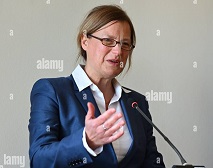The Chairperson of the International Organization for Migration (IOM) Council, Ambassador Dr. Katharina Stasch, today concluded a three-day visit to Ethiopia, where she met with IOM staff, senior Government officials, Civil Society Organizations, UN Country Team, and development counterparts.
Ambassador Dr. Stasch observed how IOM operates in Ethiopia under the humanitarian, emergency, development and peacebuilding response and got briefings on regional migration and mobility dynamics.
The Council, which is the highest authority within IOM and is composed of delegates from each of the 175 Member States, determines policies, provides guidance, and oversees the Organization’s operations.
The current chair visited Ethiopia to receive a first-hand impression of IOM’s diverse operations in the country and to gain a deeper understanding of the opportunities and challenges as well as partnership within UN and development partners.
Ethiopia, a Horn of Africa country, is experiencing a significant humanitarian crisis due to climate, conflicts, disease outbreaks, and economic shocks. Additionally, migrants from the country, who often arrive under irregular circumstances, face risks like exploitation and violence, and IOM is working with key government entities to develop policies and measures to enhance protection, well-being and assistance during and after risky journeys.
Key IOM counterparts that Ambassador Dr. Stasch met with include State Minister of Women and Social Affairs, H.E. Mrs. Huria Ali, H.E. Mr. Belayhun Yirga, State Minister of Justice, Ambassador Shiferaw Teklemariam, Commissioner for the Disaster Risk Management Commission of Ethiopia, Head of Ethiopia Human Rights Commission, the UN leadership and local actors like non-governmental and civil society organizations.
In line with the visit, discussions focused on how the government and IOM could collaborate more closely to better manage migration, address irregular migration, and enhance the protection of displaced and vulnerable populations.
Additionally, she visited Transit Centers in Addis Ababa, providing support for returning and resettling migrants. She also travelled to Mekelle, Tigray, where she met with Mr. Getachew Reda Kahsay, President of the Tigray Interim Regional Administration and the Durable Solutions Technical Working Group co- chaired by IOM and UN partners.
The field visit covered the challenges faced, needs and priorities for displaced communities and noted the top priorities and need for durable solution. 1.5 million people in Tigray displaced by conflict have returned to their homes, but another 1 million remain displaced due to inaccessibility, lack of assistance and loss of livelihood and services.
While in Tigray, she also visited Sabacare 4 camp, where IOM provides life-saving supplies and services to 2,300 displaced families or 9,700 individuals as part of its multi-sectoral humanitarian response.
“It takes many people’s contribution to bring the change that is needed. One thing that we can do is to amplify your voices so that more people can know and act to bring that change,” she said.
At the African Union Commission (AUC), officials commended IOM for its collaboration over the past twenty years to help establish policies and strategies to improve mobility and to help resolve humanitarian crises on the continent.
